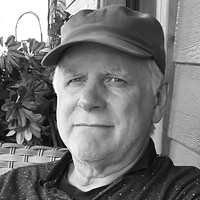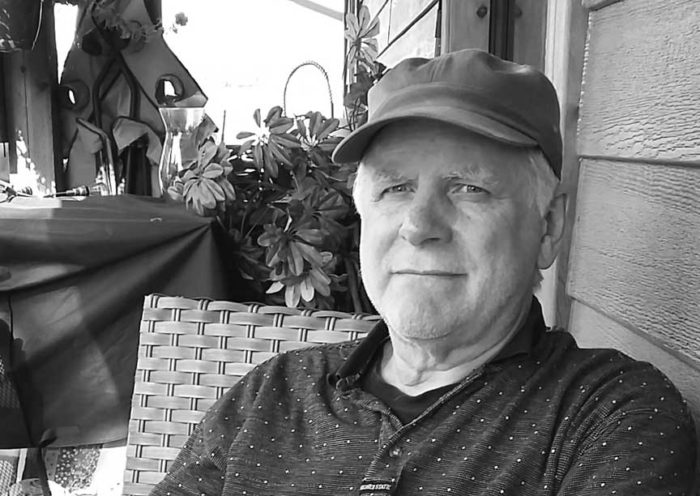inside the Forbidden City
by James Thurgood
this Ming nightmare: hordes
tromping imperial courtyards,
barbarians mugging
for posterity
from royal balconies
we squeeze, shove shoulders
to metal rails
stretch, strain, crane
raise cameras to faces, over heads
for shadowed glimpses
of satin cushions long-faded under
kowtowing courtiers and concubines
– pushy crowds with earned entry
to sheds of crumbling treasure
hope for a shimmer of silk
clack of fan
in regal hand
– we press the bars and gawk
like peasants brought to witness
the jailed Last First Wife
– who warned her Emperor
the Japanese despise your Ching Dynasty –
demand towels, water
clean linen
of ghost servants,
her own body risen against her
for starving it of opium
back home
we will tell our neighbours
but bending to work
wish, some of us
guards had
barred the gates
letter from Donghai
wake up, Father, till I tell you
how you’d like it, this pier
where beat-up wooden boats herd five-six deep
black and blue hulls splintered, faded
red flag jolly aloft each main-mast
decks grey with ground sea-grime
white with tromped and broken shells
burly boys toting tubs abrim
with rubber tentacles and finned legs
shell and scale all iridescence
all purples, yellows, silvers, pinks
murk-greens – bristles, claws
horns and webs – feelers, fangs
– where sun-browned girls in scarves
squat back of sea-snail vats
and starfish trays
wind-burned women kerchiefed
grin at a lau-wei out-of-water
leathern fishermen bare-headed, all rubber boots
all haggle and bark
as tip-toeing townsfolk
skirt slime puddles
start from horny vans –
here fishwives by scores
secret in workcoats, gloves
and peaked bonnets battened down with scarves
sort nets like other Fates
untangling lives –
briny breeze, seafolk
wheeling-dealing, lusty youth
plain work – just like the wharf in Arichat
circa 1928
then the market-proper:
rows of stalls bright-caparisoned
– each fresh live sea-beast of the pier
dried, hung, drawn and quartered
piled where those are pearls
that were eyes, are necklaces,
shells wind-chimes
we could sit by Moon Bay, Father
in Bohai’s breeze
savor some sea-dish
watch livings earned – you foretelling
gain or loss, might suggest
half in fun and all in earnest
my next thousand-li step
I write, Father
since you are so distant
and I can’t wait to tell you
if only you’d wake
from that dreamless sleep
Notes: 1) lau-wei: foreigner (literally, ‘Mister Foreigner’); 2) Arichat: in Cape Breton; 3) Bohai: sea or gulf adjoining Yellow Sea; 4) li: measure of distance; figurative equivalent of a mile
er-hu player
after the restaurant
– upstairs room
a good twelve dishes,
toasts enough to health and long life
to reduce the chance of either –
three couples arm in arm, we hear yearning
through new concrete apartment blocks
strains of er-hu
– find on a bench
an old man, smiling wife
folded wheelchair
may we listen
this fresh evening
he turns on a radio
too shy I’m told
hasn’t played for so long
– he offers the instrument
to the lao-wei musician
in the old fiddlers’ way:
do you know enough to appreciate
but not to out-do
bu, bu; sie-sie I decline
radio again
soon on warmer nights
musicians gather
come back he tells us
but I’ll be gone
will only picture them summer evenings
five or six old men
another er-hu, a wooden flute
lute, zither, gourd-pipe
ancient music
setting off, we hear once more,
are followed by
his fading tones
looking back, I make out
the wife turned to watch us
her face a waning moon
exotic travel
the shower:
open corner
in a small cell
I turn the tap overhead
and chest-height valve
– nothing from shower-head
– turn more, a cold spray
around valve
which with more turns
targets bare flesh
as shower-head looks on, dry-eyed
another turn –
valve shoots to palm
fire-hose torrent blasts chest,
rebounds all directions
the valve – surprise –
does not screw back –
but a firm hand behind
holds back the flood
what now
extend right leg –
Monkey Fist toes grab underwear –
crook leg to Hissing Snake
retrieve underwear with free hand
pass foot through hole
lower foot to floor
holding valve in place,
underwear half up
insert left leg in left-hole
with hula swivel
hoist underwear to waist
assume Floating Crane –
stretch left leg to door handle,
Monkey Fist toes turn handle
door is locked
gently kick
call hey ni-hao hey! –
kick till Elder Brother appears
wavering through frosted glass
sliver by sliver door unlocked opens
head peeks round
– upstage
a chorus of Chinese women
tragic and comic
Elder Brother shuts water
– scuttle to bedroom
from the kitchen
women laughing
leaving Longkou
remember at Penglai
the fortress
that warning-sign: say no
to feudal superstitions
sea-fog sneaks
on dragon feet
paved street
under lights
where I stroll
my last evening –
from a clutch of teenaged ghosts
a girl’s jade voice:
welcome to Longkou
yelling, clapping, pebble-tossing
to the window
– Elder Brother, drink in hand, looks
and turns back inward
the road to Yantai:
old man in blue
pushing a bicycle up a dirt hill
pestered by six white goats
among roadside vendors
a farmer, arms outstretched
hawks five-feet of writhing snake
lonely highway –
on the median
a shrub in flames
BIO

James Thurgood was born in Nova Scotia, grew up in Windsor, Ontario, and now lives in Calgary, Alberta. He has been a general labourer, musician, and teacher – not necessarily in that order. His poems have appeared in various journals, anthologies, and in a collection (Icemen/Stoneghosts, Penumbra Press).


















